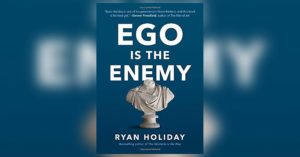Ego is the Enemy: From Self-Awareness to Self-Actualization
Eighteen months ago, I woke up in the middle of the night with a racing heart and shortness of breath. Cash reserves at our company were falling. We’d made large investments to expand our successful business, but they weren’t paying off fast enough. There was no end in sight.
The investments we’d made weren’t bad; they were just aggressive. And the aggressiveness was fueled by a belief that we could win at just about anything. We had been winning. We were known as winners. So it was time, we concluded, to double down.
Cash (or lack of it) can force clarity around reality, and this was clear: These investments weren’t winning at the rate I had predicted; and something had to change. I had woken up anxious, but that wasn’t all. It hurt my ego.
To be able to move forward, we had to learn, adapt, and improve…with more humility. This meant a more sober assessment of our capabilities and less of an emotional response to setbacks.
Ego Is the Enemy
I need to keep working on my humility, making life less about me and my ego. So, I’ve been interviewing successful leaders described by others as uniquely humble. I’m trying to better understand: What are the defining characteristics of a humble leader that gets results?
To complement the interviews, I recently read Ego Is the Enemy, by Ryan Holiday. It’s an excellent profile of famous humble (and not-so-humble) leaders, along with the lessons we can learn from them.
Below are a few of my favorite excerpts from the book. I hope you’ll find them as helpful as I did.

Self-Awareness
I’ve categorized this excerpt as “Self-Awareness,” because humility starts with a clear and sober recognition of ourselves.
One might say that the ability to evaluate one’s own ability is the most important skill of all. Without it, improvement is impossible. And certainly ego makes it difficult every step of the way. It is certainly more pleasurable to focus on our talents and strengths, but where does that get us? Arrogance and self-absorption inhibit growth.
You must practice seeing yourself with a little distance, cultivating the ability to get out of your own head. Detachment is a sort of natural ego antidote. It’s easy to be emotionally invested and infatuated with your own work. Any and every narcissist can do that. What is rare is not raw talent, skill, or even confidence, but humility, diligence, and self-awareness.
The pretense of knowledge is our most dangerous vice, because it prevents us from getting any better. Studious self-assessment is the antidote.
Self-Actualization
I’ve labeled this excerpt “Self-Actualization,” because our egos reflect what we most desire.
How do you take pride in yourself and your work? John Wooden’s advice to his players says it: Change the definition of success. “Success is peace of mind, which is a direct result of self-satisfaction in knowing you made the effort to do your best to become the best that you are capable of becoming.” “Ambition,” Marcus Aurelius reminded himself, “means tying your well-being to what other people say or do…Sanity means tying it to your own actions.”
Warren Buffett has said the same thing, making a distinction between the inner scorecard and the external one. Your potential, the absolute best you’re capable of – that’s the metric to measure yourself against. Your standards are. Winning is not enough. People can get lucky and win. People can be assholes and win. Anyone can win. But not everyone is the best possible version of themselves.
Where is your ego the enemy? Where is it too much about you and not enough about others?
They are difficult questions to answer, but endlessly worth asking.









Comments are closed here.